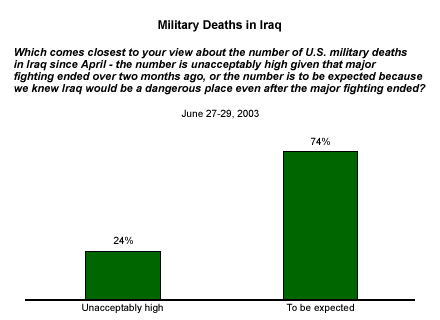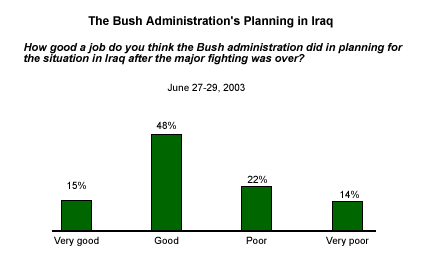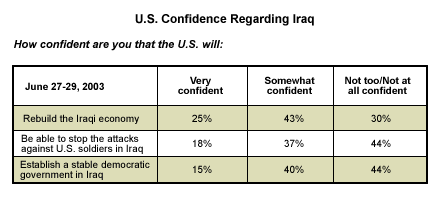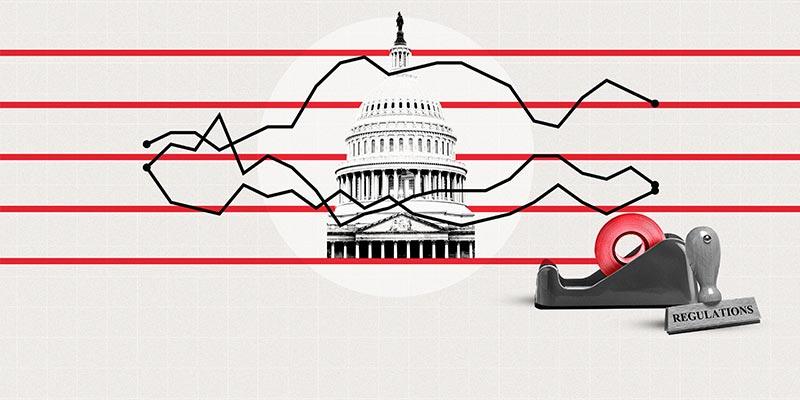On Monday, another U.S. soldier was killed in Iraq, bringing the total number of U.S. hostile fire casualties to 33 since President Bush announced that major fighting in Iraq had ceased. In the same period, 48 troops have died from accidents and non-hostile shootings. A recent Gallup Poll* indicates that Americans are not entirely optimistic that attacks against U.S. soldiers will stop. Further, a majority of Americans think the number of deaths in the last two months is "to be expected."
One in Four Say Death Count Is Unacceptably High
The survey -- conducted June 27-29 and prior to the most recent U.S. casualties -- asked Americans whether the number of U.S. deaths is "unacceptably high, given that major fighting ended over two months ago," or whether the number is "to be expected because we knew Iraq would be a dangerous place even after the major fighting ended." A majority (74%) of respondents said the number of military deaths is "to be expected," while 24% said the count is "unacceptably high."

Not surprisingly, politics factor into people's responses to this question. Roughly a third of Democrats (34%) believe the death count is unacceptable, as do 26% of political independents and just 13% of Republicans. But a majority of all political groups believe the casualty levels are what one would expect.
Nonwhite Americans are more likely than white Americans to say the number of military deaths is unacceptably high. Specifically, 33% of nonwhites feel this way, compared to 22% of whites. Also, the oldest Americans (those 65 and older) are more likely than any other age group to believe the number of deaths is too high. Thirty percent of those over 65 think so, at least six percentage points higher than any other age group.
Rate the Administration
Certainly, the Bush administration considered the difficulties of maintaining troops and establishing a new government in a war-torn country before declaring the formal fighting in Iraq over on May 1. But as the death toll increases, many members of Congress and other observers have started to question the administration's level of preparation for the stabilization and rebuilding processes. Gallup data indicate the public gives a positive, but not overwhelmingly positive, assessment of the Bush administration's planning for the situation in Iraq.
While a majority of Americans (63%) think the Bush administration did a good job planning for the situation in postwar Iraq, just 15% rate the planning as "very good." A little more than a third of Americans (36%) say the administration did a "poor" or "very poor" job planning for this situation. These percentages closely mirror the basic levels of support for the war Gallup finds in other questions.

Americans Not Overly Confident in U.S. Ability to Achieve Postwar Goals
Gallup also asked Americans about specific aspects of the situation in Iraq, and a large number of Americans did not exude confidence, although in most cases a majority was at least somewhat confident. For example, slightly more than half of Americans (55%) said they are confident in the United States' ability to stop attacks against U.S. soldiers in Iraq -- including 18% who are "very confident." Forty-four percent expressed a lack of confidence that the United States can stop the attacks -- including 18% who said they were "not at all confident."
It's unrealistic to believe that a new government can thrive in an atmosphere in which violence abounds. So the end of overt fighting may be a prerequisite to achieving civic goals in Iraq. When asked about the prospects of establishing a stable democratic government Iraq, 55% of Americans express some level of confidence (just 15% being very confident) and 44% are not too confident or not at all confident. This represents a decline in confidence when compared to a March poll conducted during the major phases of the war, when 65% of Americans were confident that the United States could establish a stable democratic government in Iraq.
Confidence in the prospect of rebuilding Iraq's economy is higher. Of five items tested, Americans had the most confidence in this. Specifically, 68% of Americans are confident (25% very confident), while 30% are not too confident or not at all confident that the United States can rebuild Iraq's economy. By comparison, Americans expressed considerably less confidence that the United States can find weapons of mass destruction in Iraq (53%) or capture or kill Saddam Hussein (48%). On these two items, the public is far less confident now than it was during the war. In March, 84% of Americans were confident the United States would find weapons of mass destruction and 70% were confident the United States could capture or kill Saddam.

*Results are based on telephone interviews with 1,003 national adults, aged 18 and older, conducted June 27-29, 2003. For results based on the total sample of national adults, one can say with 95% confidence that the margin of sampling error is ±3%.
